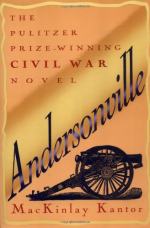“Well, Ole Boo gits us agin, to-day.”
He was so unvarying in this salutation to the morn that his designation of disagreeable weather as “Ole Boo” became generally adopted by us. When the hot weather came on, Dawson’s remark, upon rising and seeing excellent prospects for a scorcher, changed to: “Well, Ole Sol, the Haymaker, is going to git in his work on us agin to-day.”
As long as he lived and was able to talk, this was Dawson’s invariable observation at the break of day.
He was quite right. The Ole Haymaker would do some famous work before he descended in the West, sending his level rays through the wide interstices between the somber pines.
By nine o’clock in the morning his beams would begin to fairly singe everything in the crowded pen. The hot sand would glow as one sees it in the center of the unshaded highway some scorching noon in August. The high walls of the prison prevented the circulation inside of any breeze that might be in motion, while the foul stench rising from the putrid Swamp and the rotting ground seemed to reach the skies.
One can readily comprehend the horrors of death on the burning sands of a desert. But the desert sand is at least clean; there is nothing worse about it than heat and intense dryness. It is not, as that was at Andersonville, poisoned with the excretions of thousands of sick and dying men, filled with disgusting vermin, and loading the air with the germs of death. The difference is as that between a brick-kiln and a sewer. Should the fates ever decide that I shall be flung out upon sands to perish, I beg that the hottest place in the Sahara may be selected, rather than such a spot as the interior of the Andersonville Stockade.
It may be said that we had an abundance of water, which made a decided improvement on a desert. Doubtless—had that water been pure. But every mouthful of it was a blood poison, and helped promote disease and death. Even before reaching the Stockade it was so polluted by the drainage of the Rebel camps as to be utterly unfit for human use. In our part of the prison we sank several wells—some as deep as forty feet—to procure water. We had no other tools for this than our ever-faithful half canteens, and nothing wherewith to wall the wells. But a firm clay was reached a few feet below the surface, which afforded tolerable strong sides for the lower part, ana furnished material to make adobe bricks for curbs to keep out the sand of the upper part. The sides were continually giving away, however, and fellows were perpetually falling down the holes, to the great damage of their legs and arms. The water, which was drawn up in little cans, or boot leg buckets, by strings made of strips of cloth, was much better than that of the creek, but was still far from pure, as it contained the seepage from the filthy ground.




